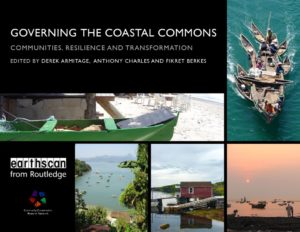Governing the Coastal Commons
Communities, Resilience and TransformationOverview
“Governing the Coastal Commons: Communities, Resilience and Transformation“, edited by CCRN researchers Derek Armitage, Anthony Charles, and Fikret Berkes, examines how coastal communities are adapting to environmental change, and explores approaches to governing the coastal commons, emphasizing a social-ecological systems perspective, and the role of resilience and transformation. In particular, the volume describes the attributes of governance that foster deliberate transformations and help to build resilience in social-ecological systems.
The focus is explicitly on the many small communities that are closely connected — culturally, economically and physically — to coastal systems, and that are often on the front lines of efforts to transform untenable conditions. Of particular interest are the identification of conditions that threaten coastal commons, the ingredients to foster transformative change, the manner in which these ingredients have led to ‘better’ or different social-ecological outcomes. Also of great interest are the underlying issues of power and agency, including issues of who is defining ‘better’ outcomes for transformations.
Contributions to this volume are integrative and complementary, each addressing, though in different ways, the core concepts and questions raised in the book. The various chapters emerge from different geographic and socio-political settings – from South Africa to Oceania to the Americas, Asia and Europe – and in doing so, bring unique insights and collective perspectives on the challenges and potential for change.
To address the core themes of this volume – how coastal communities globally are adapting to change, and how the practices they are employing are transforming the circumstances in which they are embedded – the book is structured into two main sections: “Ingredients” and “Opportunities”.
The first section of the book emphasizes the “Ingredients” for transformative change in the coastal commons. The chapters in this section draw attention to issues of rights and access, the importance of participation and participatory processes, legal and institutional changes, the role of customary or traditional systems of decision making, the role of values and value change, and the importance of learning processes.
The second section of the book – Opportunities – showcases examples and initiatives of transformations in governance of the coastal commons. Some of the chapters reflect major shifts in governance arrangements (e.g., the emergence of community-based resource management, or the formation of network forms of governance), but as is common in many situations of change and transformation, several examples reflect more mixed outcomes and the challenges of scaling transformative processes upwards and out from community scales.
Continue reading to learn more about what this book contains and browse the tabs to the right for a detailed summary of each chapter.



